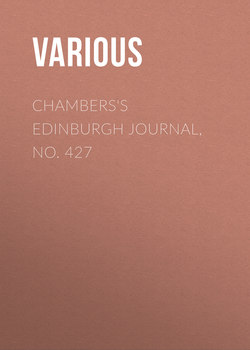Chambers's Edinburgh Journal, No. 427

Реклама. ООО «ЛитРес», ИНН: 7719571260.
Оглавление
Various. Chambers's Edinburgh Journal, No. 427
THE CHARITABLE CHUMS' BENEFIT CLUB
LA ROSIÈRE
RAMBLES IN SEARCH OF WILD-FLOWERS
AN EVENING IN WESTMINSTER
'MEN OF THE TIME.'
ARCHBISHOP WHATELY'S BOOK OF SYNONYMS
'CHAPTER ON CATS.'
A MARINER'S WIFE
REMITTANCES TO AND FROM EMIGRANTS
FOREST-TREES
WHISKY AND MISERY
Отрывок из книги
About twelve miles from Paris is situated the pretty vernal hamlet of Maisons Lafitte. It hangs around the Château Lafitte—a princely residence, formerly the property and dwelling of the well-known banker of that name, but for many years past in other hands. In front of the château, a broad avenue of greensward strikes straight away through a thick forest, extending many miles across the country; and parallel with the front of the building is an avenue still broader, but not so long—La Grande Allée—wherein the various fêtes of the hamlet are celebrated, and which, moreover, forms a principal scene in the following narrative.
Before the Revolution of 1793, the name of Gostillon was familiar as a daily proverb to the people of Maisons. There were three or four branches of the family living in the neighbourhood, and well known as industrious and respectable members of the peasant class. When the earthquake comes, however, the cottage is as much imperiled as the palace; so the events which brought Louis XVI. and Marie Antoinette to the block, and sent panic into every court in Europe, also broke up and dispersed the humble house of Gostillon. In the awful confusion of the times, some were slain upon barricades; some sent hither and thither with the army, to perish in La Vendée or elsewhere; and some fled to seek safety and peace in foreign lands. Thus it came to pass, that at length there were only three females in Maisons—a widow and her two daughters—bearing the once common name. Mme Veuve Gostillon managed to obtain a living by cultivating a small garden—the flowers and fruit from which she sold in the markets of Paris—and by plying her needle. Her daughters were named Julia and Cecilia, and there was the somewhat remarkable difference of eight years between their ages.
.....
But Victor and Julia were not made for each other. He was thriftless, idle, dissolute—the small roué of the neighbourhood: she was careful, industrious, virtuous. He was good-looking—of a dark, saturnine beauty, insidiously impressive, like the dangerous charms of a tempter; she was radiant and lustrous with the sweet graces of modesty, innocence, and intelligence. Julia, however, young and susceptible, was for a time pleased with his attentions. Persuasive powers of considerable potency, and personal attractions of no mean sort, were not exerted and prostrated at her feet entirely in vain. Ingenuous, trustful, and inexperienced, she listened to the charmer with a yielding and delighted ear, and was happy as long as she perceived nothing but sincerity and love. It was but for a time, however. The Widow Gostillon liked not her daughter's lover. Of more mature perception, of sharper skill in reading character than her child, she conceived a deep distrust of the airy smile and studied gallantry of Victor Colonne. She took counsel with matrons old and circumspect as herself; made herself acquainted with Victor's history; watched his looks, listened to his words narrowly and scrutinisingly; and, day by day, felt more and more strongly that she liked him not—that there was mischief in his restless eye and soft musical voice. She communicated her fears to Julia, told her the history of her suitor, and bade her be on her guard. Julia was startled and distressed. These suspicions checked the brightness and little glory of her life, and settled wanly and hazily on her soul, like damp breath on a mirror. But they served as points of departure for daily thoughts. Looks and words were watched, and weighed, and pondered over with wistful studiousness; and while Victor believed his conquest to be achieved, his increasing assurance and gradual abandonment of disguise were alienating him from the object of his pursuit. Julia had accompanied him on different occasions to the château; been presented to his father; and had been seen, admired, and kindly spoken to by the Comtesse Meurien and her daughters. Victor had lost no opportunity of strengthening his suit by stimulating her ambition and pride; but it was without avail. Though pleased for a time, she soon discovered that he was cold, heartless, and even dissolute. The intimacy betwixt them was fast relapsing into indifference, and, on her side, into dislike, when a certain dénouement of Master Victor's notorious love-makings, accompanied by disgraceful circumstances, determined her to put an end to it, once and for all.
'So you are determined?' exclaimed he with ill-restrained anger, as she repeated her resolve to him for the fourth or fifth time.
.....